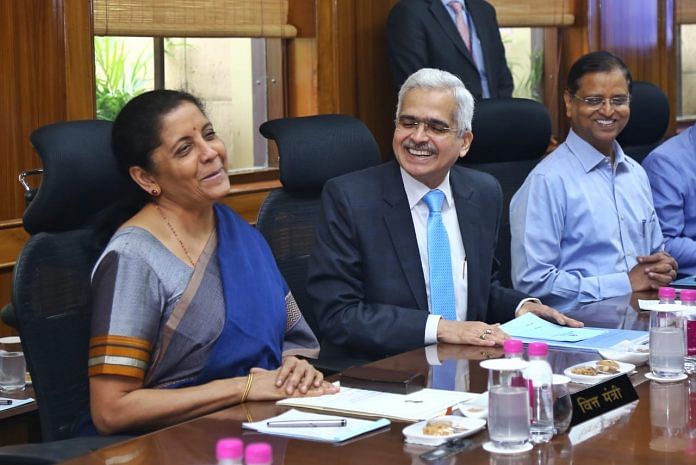The Reserve Bank of India’s (RBI) transfer of this year’s surplus and a part of the excess capital it was holding to the government is a step in the right direction. Not only will it help the government reduce its borrowing this year, it corrects a wrong on a matter of principle.
The RBI earns ‘seigniorage’ in its role as banker to the government and on behalf of the government. The next step required is further legislative changes. The RBI Act, 1934 has not kept up to date with modern regulatory practices. RBI held back surpluses in the form of reserves due to ambiguity in the RBI Act.
Each country has different objectives and thus central banks hold different levels of equity capital. The central banks of many countries have negative equity, as it is in fact not a problem for central banks. Should the decision be left to the RBI board?
The RBI board decided not to transfer any of the revaluation reserves. It deserves to be pointed out that most countries have very small, or even negative, revaluation buffers (for example, Brazil has 0.02, Chile 0, Hong Kong 0.44, Japan 0, Korea -1.42, New Zealand 0.57, Philippines -1.02, Peru -1.12, Sri Lanka 0.48, Thailand 3.04 and Mexico 0).
Small risks
In addition, after examining the various reasons for why and how much equity capital is held by central banks, it is clear that the kinds of risks RBI holds is very small. Holding equity capital for those risks is, therefore, not justified. In any case, the sovereign is capable of absorbing these risks. For example, should capital be held for the credit risk of banks? In India, banks hold government of India bonds for SLR requirements, which they could use as collateral in a crisis situation. Thus, the quality of collateral need not be compromised. In any case, sovereign can very well carry this risk, if it were to arise.
The proposed Economic Capital Framework uses Basel norms for risk evaluation. Basel norms are used to estimate risk taken by commercial banks and, as RBI is not a commercial bank, this risk framework should not be applied to RBI.
Since the recent financial crisis, many central banks in EU countries have held more equity capital. This is an important measure for these central banks, as they are required to re-capitalise commercial banks by buying their illiquid assets and becoming market makers. Since banks are usually privately-owned in these countries, these governments avoid the political fallout of a bail-out, and the central banks take on this responsibility.
In India, however, the problem of re-capitalisation remains with the government and not the central bank, and the RBI therefore need not provision for this risk through equity capital. Not only has the RBI never before been asked to re-capitalise banks, the large share of public sector ownership of banks precludes the government requiring the RBI to play such a role.
Also read: Next, Nirmala Sitharaman needs to undo the mistakes of her predecessors
Reserve Fund
The tension about RBI reserves in India arises from the fact that Section 46 of the RBI Act creates the ‘Reserve Fund’ of Rs 5 crore, an amount that is clearly out of date. This led to action by the RBI board under Sections 47 and 58, which give powers to the board to decide how much to hold.
Section 47 of the RBI Act says: “After making provision for bad and doubtful debts, depreciation in assets, contributions to staff and super-annuation funds and for all other matters for which provision is to be made by or under this Act or which are usually provided for by bankers, the balance of the profits shall be paid to the central government.”
Section 58 says: “The central board may, with the previous sanction of the central government by notification in the official gazette, make regulations consistent with this Act to provide for all matters for which provision is necessary or convenient for the purpose of giving effect to the provisions of this Act.”
Difficulties haven’t ended
While the matter of RBI risk capital and surplus transfer appear to be solved, there should be no doubt that as the amount of seigniorage increases over the years, these difficulties, which caused enormous tension between the RBI and the government, and perhaps the resignation of a governor and a deputy governor, have not ended.
This problem should not be left ambiguous in the law. The matter should be debated in Parliament and necessary amendments should be made to the RBI Act.
The author is an economist and a professor at the National Institute of Public Finance and Policy. Views are personal.
Also read: Why RBI Governor Shaktikanta Das has lent a Rs 1.76 lakh crore umbrella to Modi govt




I am not a fan of framing a law to regulate each activity, including how many glasses of water one should drink each day. Consider the FRBM Act and how successive governments have made short work of it. How many cusses are quietly merged into the general revenues of the government, not spent for the designated purposes. 2. As far as transfer of surplus is concerned, Revaluation reserves are clearly a no no. Why should at least one third of each year’s genuine earned surplus not be added to the reserves. That is how the RBI has something in the bank, when the rest of the government is so clearly broke. 3. The Governor is the custodian of the RBI’s long term institutional interests. History will make its judgments.
cesses…